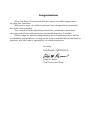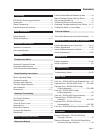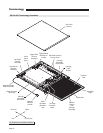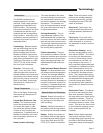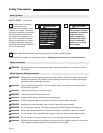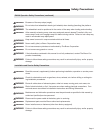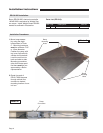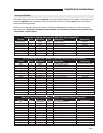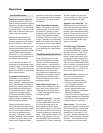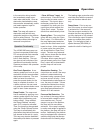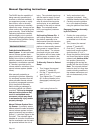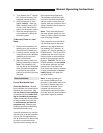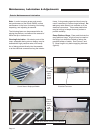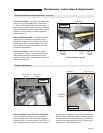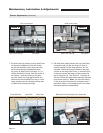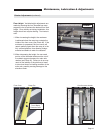
Page 8
nance and lubricating procedures.
See the Maintenance and Adjust-
ments section for more detailed
information.
Cold Climate Recommenda-
tions: The vehicle in which the
ramp has been installed should
be stored in a garage or other
sheltered place if possible, espe-
cially during inclement weather
conditions. When the ramp is not
in use, it should be in the stowed
position to prohibit rain, snow, ice,
dirt, mud, or other foreign materi-
als from entering the ramp open-
ing or building up on the platform
surface.
Ramp Operating Instructions
Ramp Operating Instructions
address the required controller
inputs and the corresponding
ramp functions. Instructions for
customer specific display panels
and interlock options will not be
addressed due to the bound-
less variations in application and
installation of the ramp. Manual
Operating Instructions are ad-
dressed in the event of power or
equipment failure.
Before Operating Ramp: Al-
ways park the vehicle on a level
area, away from vehicle traffic.
Place the vehicle transmission
in “Park” and engage the park or
emergency brake.
Customer Interlock: The ramp
controller requires a (+) 24V sig-
nal be supplied which interlocks
the ramp functions with a cus-
tomer supplied vehicle signal. If
this interlock signal is not present,
the controller will not provide any
outputs necessary to operate the
ramp. If the interlock signal is lost
during ramp operation, the plat-
form assembly will automatically
complete the ‘full stow’ sequence,
and the controller will not func-
tion any further until the interlock
signal is present once again.
Operator Input Switches: The
RA200 electronic controller pro-
vides fully automatic operation of
all ramp functions, which are pro-
tected by the obstruction sensing
feature. Ramp functions can be
performed from any position the
platform assembly happens to be
in at the time the operator input
switch is activated.
Two-Way Toggle Operation:
In two-way toggle mode, there
are separate switches for deploy
and stow functions. One of the
switches must be pressed and
held or locked into position (con-
tinuous input signal required) for
the RA200 to operate. The ramp
will move in the selected direction
until the switch is released (signal
interrupted), the unit reaches the
end of the travel, or a “halt condi-
tion” occurs (details follow).
Halt Conditions: Several condi-
tions can cause a normal se-
quence to terminate (stop):
• Obstructions (details below)
• Customer Interlock signal lost
(see Customer Interlock)
• Manual Release System ‘un-
locked’ signal present (see
Manual Operating Instructions:
Mechanical Method)
• Control Box Manual Input Switch
pressed (see Manual Operating
Instructions: Electrical Method)
• Weight sensed on platform
Obstructions: The controller
performs obstruction sensing (see
RA200 Terminology: Obstruction
Sensing) on all stow and deploy
movements of the ramp (in, out,
up, down), whether operated nor-
mally or with the manual override
switches. The selected obstruc-
tion response mode configured
Operation
Pre-Operation Notes
Operation Procedure Review:
The RA200 operator should re-
view all safety precautions and all
operation procedures appearing
in this manual prior to attempting
to operate ramp. Failure to do so
may result in serious bodily injury
and/or property damage.
Operate the ramp through all
functions to ensure the proper
use and operation of the ramp is
clearly understood. Be sure to
review the manual operation pro-
cedures, particularly the proper
re-engagement procedure of the
manual cable release system
(see page 10). Any questions or
concerns should be forwarded to
your Braun representative.
Do not operate the ramp if it is
suspected to be damaged, have
excessive wear, or any abnormal
condition. Discontinue use imme-
diately and contact an authorized
Braun representative.
Preventative Maintenance:
Maintenance is necessary to
ensure safe and trouble-free
ramp operation. General preven-
tative maintenance consisting of
inspecting, cleaning and lubricat-
ing procedures should be part
of a scheduled routine. Simple
inspections can detect poten-
tial ramp operational problems.
Adjustments can be made as
needed (details in Maintenance
and Adjustments section).
Regular preventative mainte-
nance will reduce potential ramp
operation downtime and increase
the service life and reliability of
the ramp, as well as enhanc-
ing safety. Exposure to harsh
weather elements, environmental
conditions or heavy usage may
require more frequent mainte-



